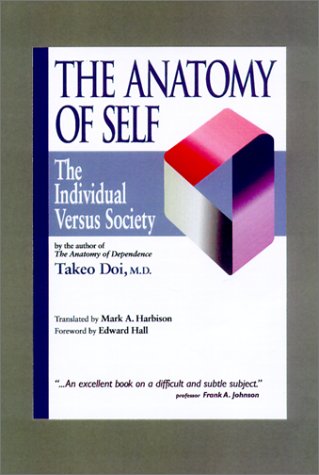The Anatomy of Self: The Individual Versus Society - Softcover

The Anatomy of Self is a sequel to Doi's pioneering and acclaimed bestseller, The Anatomy of Dependence in which he set out his theory of passive, dependent love as the key to understanding the Japanese. More than 100,000 foreign readers have been intrigued by this work. With The Anatomy of Self, Japanese society again serves as the subject of an analysis by one of its most original thinkers.
Like Doi's renowned Anatomy of Dependence, The Anatomy of Self addresses the question of the Japanese individual and his or her integration into Japanese society. Its approach is based on an analysis of the Japanese perception of public and private. What kind of society is made up of individuals capable of a constant traversing between behavior based on two simultaneously held, mutually contradictory modes of perception? Doi discusses this feature of the Japanese psyche, often referring to Western psychology. He compares the individual trauma that classic Western psychology believes to result from such a split, to the Japanese sense that adulthood is only achieved by acknowledging and accommodating the difference. Finally, the wide-ranging references to history and psychology serve to provoke thought on Freudian notions of the unconscious.
"synopsis" may belong to another edition of this title.
TAKEO DOI (b. 1920), M.D., has served as a professor at the University of Tokyo and International Christian University, Tokyo, and is one of Japan's leading psychiatrists. Born in Tokyo, he graduated from the University of Tokyo in 1942. He held a number of posts at American institutes and universities, including fellowships at the Menninger School of Psychiatry and the San Francisco Psychoanalytic Institute, and was visiting scientist at the National Institute of Mental Health, Bethesda, Maryland. He also headed the psychiatric department at St. Luke's International Hospital in Tokyo. Doi has published a number of works and contributed to many more, including The Anatomy of Dependence.
Let me begin by saying a word about the nature of this book. As its title suggests, this book attempts to grasp human phenomena in general from the perspective of omote and ura, two concepts representing a way of looking at things that is unique to the Japanese language. As we shall see, it is possible to approximate these terms in English: Recto-verso, heads and tails, outside-inside, facade-interior, and so on, all give an impression of the meaning of omote and ura. Similarly, facade and truth, mask and real face, outward appearance and inner reality, all hint at the meaning of tatemae and honne. But none of these correspondences between the Japanese terms and English is precisely correct. For one thing, the English expressions make of these dyadic pairs hierarchical oppositions: facade (omote) versus inner truth (ura), outside versus inside, appearance versus reality, and, ultimately, evil versus good. In every case, the term corresponding to omote is seen as a negation, as a complication of the more "authentic" half of the pair. While this tendency is certainly not absent in modern Japanese usage of the terms, I felt that forcing them into English would only serve to exacerbate the problem and, therefore, decided to retain the original Japanese words in the English version of my book.
To the extent that omote and ura are uniquely Japanese, this book has something of the character of the so-called Nihonjinron (theories of the Japanese). As was true of Amae no Kozo (published in English as The Anatomy of Dependence), however, my purpose in writing this book is not merely to offer yet another theory explaining the Japanese. My real aim is to examine these Japanese concepts in light of ideas that originate in the West and, by doing so, to deepen them and to discover in them a universal significance. This has been the direction of my scholarly work from the very beginning.
I have taken this direction because I am a practicing clinical psychiatrist. The specialist's jargon is almost useless in a clinical situation. The whole battle is won or lost depending on what kind of communication the psychiatrist is able to establish with the patient. But precisely because this is true, psychiatrists must always keep their eyes open to what underlies language--the nuances that exist in the depths of words--and they must take responsibility for the words that they use themselves.
Therefore, even though I do discuss the health or illness of the mind, that is not the premise of my argument. Rather, for the reasons stated above, that distinction itself is subjected to analysis. It is for the same reasons that, in my discussion of other issues, I have always attempted first to clarify the meanings of the words I am using. And, again, this is why I am asking my foreign readers to go to the trouble of learning a number of terms in Japanese.
I have been forced to go far beyond the boundaries of my own academic specialty, searching for insights in the fields of sociology, philosophy, literature, and religion. This book is a synthesis of what I have gained from this search, and I hope that the reader will accept it as such.
"About this title" may belong to another edition of this title.
- PublisherKodansha USA
- Publication date2001
- ISBN 10 4770027796
- ISBN 13 9784770027795
- BindingPaperback
- Number of pages168
- Rating
Shipping:
US$ 34.79
From Germany to U.S.A.
Top Search Results from the AbeBooks Marketplace
The anatomy of self - Thei individual versus Society
Book Description Softcover. Condition: Gut. ISBN: 4770027796 - Softcover in good condition - delivery 2003 - pocket book with 170 pages - Index English Literature. Seller Inventory # 259397

